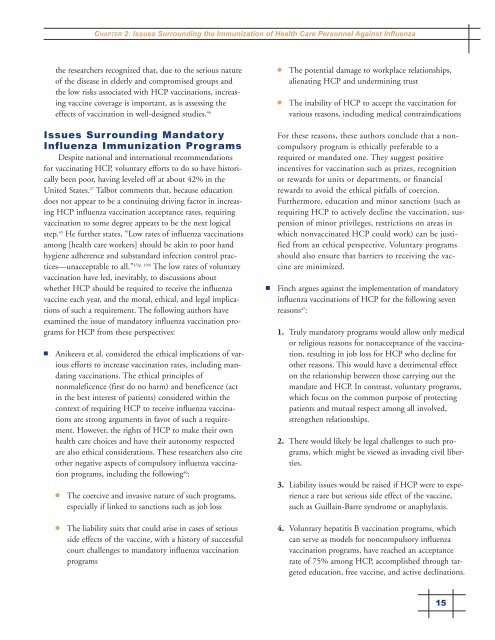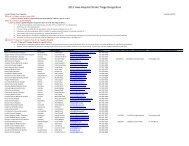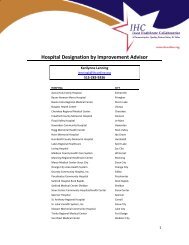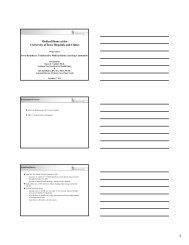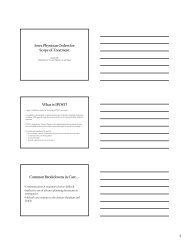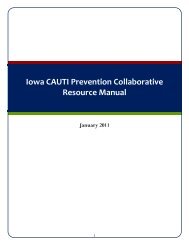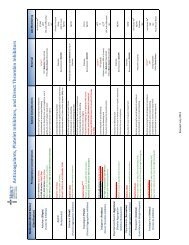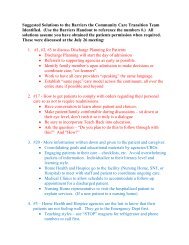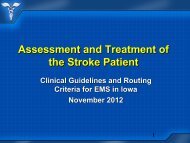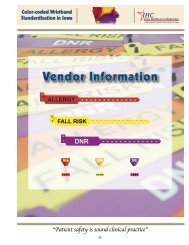Providing a Safer Environment for Health Care Personnel & Patients ...
Providing a Safer Environment for Health Care Personnel & Patients ...
Providing a Safer Environment for Health Care Personnel & Patients ...
You also want an ePaper? Increase the reach of your titles
YUMPU automatically turns print PDFs into web optimized ePapers that Google loves.
CHAPTER 2: Issues Surrounding the Immunization of <strong>Health</strong> <strong>Care</strong> <strong>Personnel</strong> Against Influenza<br />
the researchers recognized that, due to the serious nature<br />
of the disease in elderly and compromised groups and<br />
the low risks associated with HCP vaccinations, increasing<br />
vaccine coverage is important, as is assessing the<br />
effects of vaccination in well-designed studies. 44<br />
●<br />
●<br />
The potential damage to workplace relationships,<br />
alienating HCP and undermining trust<br />
The inability of HCP to accept the vaccination <strong>for</strong><br />
various reasons, including medical contraindications<br />
Issues Surrounding Mandatory<br />
Influenza Immunization Programs<br />
Despite national and international recommendations<br />
<strong>for</strong> vaccinating HCP, voluntary ef<strong>for</strong>ts to do so have historically<br />
been poor, having leveled off at about 42% in the<br />
United States. 27 Talbot comments that, because education<br />
does not appear to be a continuing driving factor in increasing<br />
HCP influenza vaccination acceptance rates, requiring<br />
vaccination to some degree appears to be the next logical<br />
step. 45 He further states, “Low rates of influenza vaccinations<br />
among [health care workers] should be akin to poor hand<br />
hygiene adherence and substandard infection control practices—unacceptable<br />
to all.” 45(p. 109) The low rates of voluntary<br />
vaccination have led, inevitably, to discussions about<br />
whether HCP should be required to receive the influenza<br />
vaccine each year, and the moral, ethical, and legal implications<br />
of such a requirement. The following authors have<br />
examined the issue of mandatory influenza vaccination programs<br />
<strong>for</strong> HCP from these perspectives:<br />
■<br />
Anikeeva et al. considered the ethical implications of various<br />
ef<strong>for</strong>ts to increase vaccination rates, including mandating<br />
vaccinations. The ethical principles of<br />
nonmaleficence (first do no harm) and beneficence (act<br />
in the best interest of patients) considered within the<br />
context of requiring HCP to receive influenza vaccinations<br />
are strong arguments in favor of such a requirement.<br />
However, the rights of HCP to make their own<br />
health care choices and have their autonomy respected<br />
are also ethical considerations. These researchers also cite<br />
other negative aspects of compulsory influenza vaccination<br />
programs, including the following 46 :<br />
●<br />
The coercive and invasive nature of such programs,<br />
especially if linked to sanctions such as job loss<br />
■<br />
For these reasons, these authors conclude that a noncompulsory<br />
program is ethically preferable to a<br />
required or mandated one. They suggest positive<br />
incentives <strong>for</strong> vaccination such as prizes, recognition<br />
or rewards <strong>for</strong> units or departments, or financial<br />
rewards to avoid the ethical pitfalls of coercion.<br />
Furthermore, education and minor sanctions (such as<br />
requiring HCP to actively decline the vaccination, suspension<br />
of minor privileges, restrictions on areas in<br />
which nonvaccinated HCP could work) can be justified<br />
from an ethical perspective. Voluntary programs<br />
should also ensure that barriers to receiving the vaccine<br />
are minimized.<br />
Finch argues against the implementation of mandatory<br />
influenza vaccinations of HCP <strong>for</strong> the following seven<br />
reasons 47 :<br />
1. Truly mandatory programs would allow only medical<br />
or religious reasons <strong>for</strong> nonacceptance of the vaccination,<br />
resulting in job loss <strong>for</strong> HCP who decline <strong>for</strong><br />
other reasons. This would have a detrimental effect<br />
on the relationship between those carrying out the<br />
mandate and HCP. In contrast, voluntary programs,<br />
which focus on the common purpose of protecting<br />
patients and mutual respect among all involved,<br />
strengthen relationships.<br />
2. There would likely be legal challenges to such programs,<br />
which might be viewed as invading civil liberties.<br />
3. Liability issues would be raised if HCP were to experience<br />
a rare but serious side effect of the vaccine,<br />
such as Guillain-Barre syndrome or anaphylaxis.<br />
●<br />
The liability suits that could arise in cases of serious<br />
side effects of the vaccine, with a history of successful<br />
court challenges to mandatory influenza vaccination<br />
programs<br />
4. Voluntary hepatitis B vaccination programs, which<br />
can serve as models <strong>for</strong> noncompulsory influenza<br />
vaccination programs, have reached an acceptance<br />
rate of 75% among HCP, accomplished through targeted<br />
education, free vaccine, and active declinations.<br />
15


